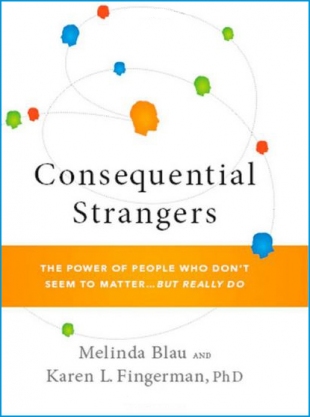Melinda Blau, a journalist and author of a dozen books, and Karen Fingerman, a psychologist, have collaborated on this fascinating and illuminating book about the changes in people's navigation of their social terrain. Those who play the largest and most important roles in our lives are intimate family members and an inner circle of close friends. But nowadays, our "social convoy" has significantly expanded to include what Fingerman calls "consequential strangers." They consist of people who play minor, limited, or temporary roles but still make a contribution to the quality of our lives.
Blau took Fingerman's research on this phenomenon, in addition to other findings in psychology, sociology, marketing, and communication, and conducted more than 200 interviews with lay people and academics. She discovered an amazing variety of consequential strangers — the owner of a local restaurant who knows your name, the UPS man who performs valuable services for your business, coworkers who lift your spirits, leisure buddies, regulars at a local eatery, next-door neighbors who sometimes do little favors for you, a reliable doctor or dentist you have been seeing for years, a pal on a committee with you, or a Facebook friend.
Consequential friends, in other words, are the people who are more than a stranger but less than a family member or close friend. At first, we might think that these peripheral individuals do not matter but the authors found the opposite: they enrich us in countless ways with emotional support, advice, important services, pleasure, information and resources, spiritual lessons, and much more.
Blau and Fingerman point out that having a diverse group of people in our social convoy — both intimates and consequential strangers — enables us to better handle productivity, health challenges, creativity, and personal growth. The authors do a fine job explaining the importance of "being spaces" that are welcoming, safe, and amenable to relaxed conversation such as cafes and taverns, public parks, online venues, and residential complexes. Here strangers can be transformed into consequential strangers. Churches, synagogues and mosques also provide this kind of being space. They can move us out of our comfort zones and into a wider arena of social connection.
The authors are realistic enough about relationships to know that they must cover the downside of some consequential strangers — difficult people, troublemakers, and those who might turn into enemies. Sometimes these individuals bring out the worst in us: anger, revenge, lying, envy, gossip, and snap judgments. Of course, from a spiritual perspective, difficult people can often be our best spiritual teachers.
Blau and Fingerman are to be commended for this enlightening work. It helps us see how our life is a cavalcade of relationships that are constantly changing and expanding according to our experience and needs.
